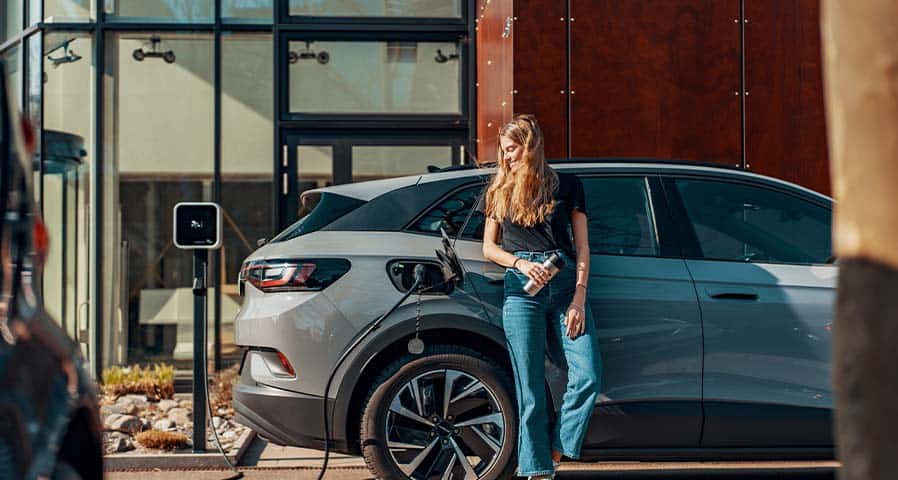Connecting stakeholders to identify funding opportunities and provide technical assistance is key to implementing EV charging infrastructure in your state. EV charger partnerships can include statewide, multi-state, and inter-tribal agencies. However, some partners are part of a national initiative while others are specific to a particular state, local, Tribal, or regional group.
Here’s a quick look at potential EV partners and their corresponding initiatives.
Alternative Fuel Corridor – FHWA
Since 2016, the Federal Highway Administration’s (FHWA) Alternative Fuel Corridor (AFC) location has been instrumental in the expansion of a notional corridor of electric vehicle charging stations.
The initiative is seeing the installation of a network of EV chargers along 75,000+ miles of the National Highway System (NHS). This includes close to 45,000 miles of the nation’s interstate system. All 50 states, including DC and Puerto Rico, have at least one designated EV corridor.
FHWA partners with federal, state, and local governments, and private industries to create a network of clean fuel stations (EV charging, hydrogen, natural gas, and propane) along interstate and major road networks so commercial and passenger EVs can travel reliably between cities, regions, and across the county.
The AFC program works with state, Tribal, and local authorities, including state transportation departments (DOTs) and Tribal transportation planning agencies. AFC also collaborates with Clean Cities coalitions to identify highways to include in the national charging network. The program encourages stakeholder cooperation and collaboration in planning and developing charging locations along corridors. The program also provides guidance on implementing clean fuel alternatives and providing directional/advertising signage.
Rural communities can participate in the AFC program to determine where EV infrastructure currently exists or the planned locations of charging stations to ensure their community is not left out of the alternative fuel corridor.
Additionally, NEVI formula funding under BIL requires the monies to be spent along EV corridors designated by the AFC program. The Joint Office of Energy and Transportation supports and guides states using NEVI funding to build their alternative fuel corridors.
EPA Regional Diesel Collaboratives
The U.S. Environmental Protection Agency’s (EPA) Regional Diesel Collaboratives is working to reduce diesel emissions through strategies that include improving fuel efficiency, electrification, and alternative fuels. The collaborations involve public and private entities who share information, and project plans, promote the uses of alternative fuel vehicles, and help leverage funding.
Regional collaborations typically include State environmental agencies, local governments, EPA regional offices, energy agencies or coalitions, nonprofits, and private-sector companies.
Rural communities may also be able to connect with Regional Diesel Collaboratives.
When reviewing potential EV charging infrastructure partners, we suggest having at least a basic plan. In our blog, EV Charging Infrastructure – Developing a Plan, we take a look at available charging equipment, procuring and installing the infrastructure, as well as hidden costs you need to be aware of.
Partnerships Between State and Tribal Environmental and Energy Agencies
State and tribal agencies often work together to plan transportation routes, this often includes EV implementation strategies. Working together, the agencies can decide on EV charger placement and identify gaps in existing EV networks.
Environmental and energy agencies at the state level (State Department of Natural Resources or State Energy Office) may also offer guidance and funding to support EV infrastructure. State-level agencies are typically operated under the direction of legislatures or governors who approve EV funding. State energy offices can also provide funding and technical support for EV infrastructure projects.
The state is also responsible for administering funds from the 2016 Volkswagen settlement. The settlement provides close to $3B to states through the Environmental Mitigation Trust. The settlement also includes a 42B investment from VW to use toward zero-emission vehicle infrastructure.
Electrify American is managing the $2B investment that will be spent on EVs and EV charging stations across the United States.
Tribal environmental agencies, Tribal environmental protection agencies, Tribal utility authorities, and Tribal Energy Development Organizations (TEDOs) are other potential partners that may offer programs and initiatives that support EV infrastructure on tribal lands.
State and Tribal DOTs (Department of Transportation)
Partnerships with state DOTs and Tribal departments can provide technical support and funding for EV charging infrastructure. The partnership can also support construction through tribal lands.
An example is the FHWA’s Congestion Mitigation and Air Quality Improvement (CMAQ) Program. The program uses a statutory formula to provide funding for projects that improve air quality and reduce traffic congestion.
The funds can be transferred to the Federal Transit Administration (FTA) to manage eligible transit projects. These projects include the purchase of electric vehicles for fleets, charging infrastructure, and shared micromobility. Currently, the FHWA’s Tribal Transportation Program has funding agreements with 135 tribes to provide safe transportation and public road access to and within Tribal lands.
Along with funding from BIL, some state DOTs are combining Volkswagen Environmental Mitigation Trust funds with state grant programs to help support EV infrastructure along alternative fuel corridors.
Additional Partnership Opportunities with Multi-State and Inter-Tribal Agencies
Several states, regions, and Tribes have partnerships and initiatives around electric vehicles. These partnerships focus on improving air quality, advocating for the encouragement of EVs, and establishing charging infrastructure.
To learn more about the existing programs and partnerships or to find out what is available in your area, contact us today to learn more by calling 484-816-2076, emailing [email protected], or schedule a call that fits your need by clicking the button below.








0 Comments